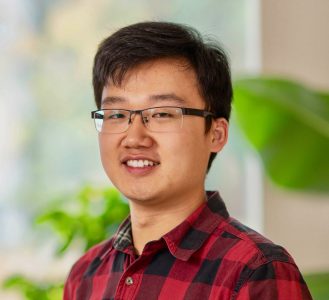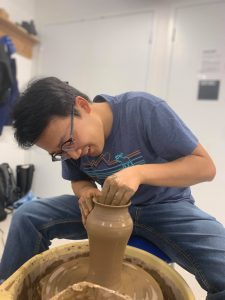Written by: Mopelola Akinlaja, PhD Candidate, Foster Lab

Edited by: Aparna Gopal, PhD Candidate, Karsan Lab

Andy An, MD/PhD Candidate
I had the opportunity of chatting with Andy An, an MD/PhD candidate in Professor Bob Hancock’s lab at the CBR. I learned about some of his passions, including bioinformatics, science communication, and pottery.
Andy’s PhD research interests revolve around understanding the immune dysregulation in sepsis, which is life-threatening organ dysfunction due to an out-of-control host response to infection. Interestingly, he described his introduction to sepsis research as serendipitous. He met with Bob to discuss his interest in a different topic for the doctorate portion of his degree. As fate would have it, he was inducted into the world of sepsis, a topic that ended up fascinating him and being more relevant to his clinical interests. Andy explained how complicated of a disease sepsis is, killing millions of people each year, with no personalized treatment currently available. More recently, during the pandemic, Andy’s research shifted towards identifying COVID-19 as a “form of viral sepsis”, and he analyzes gene expression data to better understand the various genes and pathways that become dysregulated during sepsis and COVID-19.
One of Andy’s approaches to research, that I find admirable, is how he makes patient involvement an integral part of his investigations. In his opinion, patient interactions help frame his research questions and provide him an added level of motivation to better understand how sepsis works. A poignant example he gave was how looking at the quality-of-life aspect of sepsis recovery came within his purview from interacting with sepsis patients and their families. Through “Action on Sepsis”, a UBC organised network of clinicians, researchers, and patients, Andy feels that his interactions with patients, who he considers stakeholders in his research, has helped broaden his research interests, leading him to ask more relevant questions. Andy encourages students, especially those involved in clinical research to seek out patient interaction. There are various patient groups for each disease where interested people can have conversations with patients and people who are affected by the diseases of interest. Andy strongly advocates engaging with these groups.

Andy making pottery
When asked about his favourite thing in scientific research, Andy admitted that it was a tough choice, since there are so many things he likes about the field. Perhaps the most attractive of them is the (delayed) gratification he gets from making a discovery after spending significant time doing experiments. He feels that not many professions offer the satisfaction that comes from being the first person to make an impactful discovery.
In addition to his PhD research, Andy is interested in learning about new ways to be an effective science communicator and to explain technical concepts to lay audiences. Through his YouTube channel Medicurio (youtube.com/Medicurio), he uses storytelling to communicate topics on medicine to the community at large.
We concluded our chat by talking about some of Andy’s hobbies. He is actively involved in pottery and has been co-president of the UBC Pottery Club for the last several years. He also enjoys “bringing some of nature into his house”, caring for houseplants and maintaining an aquarium in his home. As someone who pretty much grew up on UBC’s campus, he humorously gave UBC the nickname “University of Buildings and Construction.” A testament to the constant transformation of the campus he has seen over time.
Lastly, talking about his career options after completing his degree, Andy had a few ideas and plans in the making about what specialty of medicine to pursue, including internal medicine and anesthesiology. However, speaking from experience he maintains, these plans are not rigid and can change based on his experiences once he returns to medical school.
It was an absolute pleasure chatting with Andy and I’m excited to see where his career path takes him.


